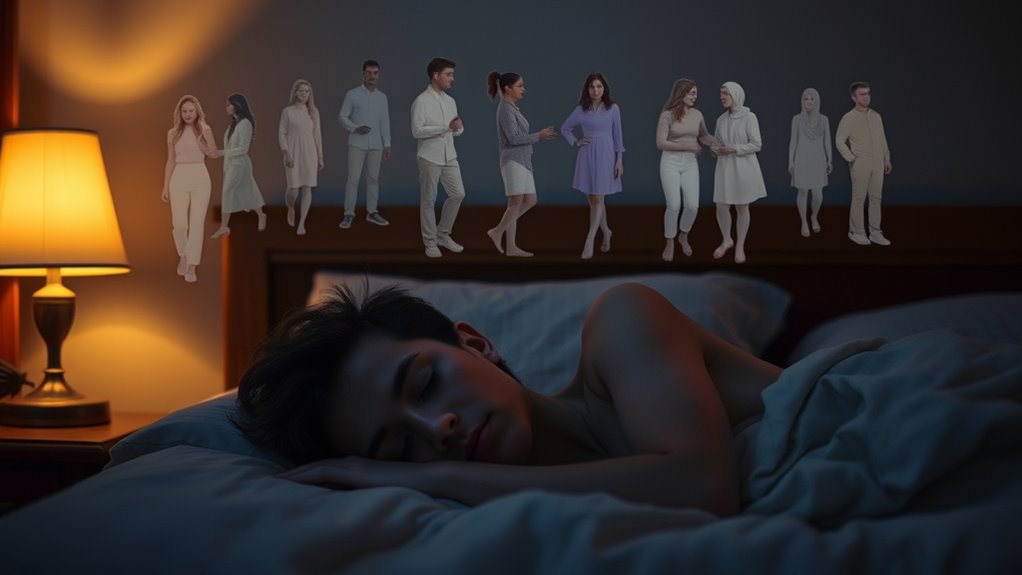Your dreams mirror your social behavior by revealing your emotional connections, conflicts, and subconscious feelings about others. When you dream of loved ones, disagreements, or social situations, it shows how your relationships influence your thoughts and feelings. These dreams can help you understand hidden emotions and social dynamics you might not openly recognize. Keep exploring, and you’ll discover how your subconscious helps shape your interpersonal skills and emotional well-being.
Key Takeaways
- Dreams reflect our emotional ties and unspoken feelings related to social interactions and interpersonal relationships.
- Vivid dream scenarios often mirror the depth of our social bonds and underlying trust or conflicts.
- Dream content can reveal hidden emotions and unresolved issues within social circles.
- Analyzing dreams helps us understand how we navigate conflicts and emotional gaps with others.
- Dreams serve as a mirror for personal growth, enhancing awareness of social dynamics and improving relationship skills.

Dreams often reflect the complex web of our interpersonal relationships, revealing hidden emotions and unspoken thoughts. When you dream, you’re tapping into your subconscious mind, which processes your feelings about the people around you. One key aspect of this is the emotional connection you share with others. If you’re deeply connected to someone, your dreams may feature vivid interactions, symbolizing trust, affection, or unresolved issues. These dreams often serve as mirrors, helping you understand your true feelings and how they influence your waking relationships. For example, dreaming of a loved one crying might highlight underlying concerns or fears you haven’t expressed openly. Recognizing these emotional signals can deepen your self-awareness and improve your social bonds. Additionally, understanding juice cleansing and its effects can remind us of the importance of nurturing our physical health to support emotional well-being.
Dreams reveal our emotional ties and unspoken feelings, helping us understand and strengthen our real-life relationships.
Conflict resolution plays a significant role in shaping your dreams as well. When conflicts arise in your waking life, your mind often continues to work through them during sleep. Dreams may dramatize disagreements or misunderstandings, giving you a chance to explore different ways of resolving issues without real-world consequences. You might find yourself in scenarios where you attempt to compromise or stand your ground, reflecting your desire to find balance. These dreams can be instructive, revealing what you’re truly willing to accept or what you need to confront. Paying attention to how conflicts unfold in your dreams offers valuable insights into your emotional resilience and your approach to resolving disagreements. They can show you whether you’re avoiding confrontation or facing issues head-on, helping you develop better conflict resolution skills in real life.
Furthermore, your dreams may also highlight the emotional gaps or mismatches within your social circle. If you feel disconnected or misunderstood, your subconscious might create scenarios where these gaps are emphasized, prompting you to consider how you can strengthen your relationships. Sometimes, dreams act as a safe space where you can rehearse difficult conversations or express feelings that are hard to share openly. They encourage emotional connection by allowing you to explore alternative ways of engaging with others, fostering empathy and understanding.
Ultimately, your dreams serve as a dynamic reflection of your social world. They reveal how you navigate emotional bonds and conflicts, providing a valuable window into your inner emotional landscape. By analyzing these nocturnal messages, you can better understand your interpersonal dynamics and work toward healthier, more authentic relationships. This ongoing dialogue between your waking experiences and your dreams helps you grow closer to others and become more skilled at resolving conflicts, leading to more fulfilling social interactions.
Frequently Asked Questions
Can Dreams Predict Future Social Interactions?
Dreams might give you some clues about future social interactions, thanks to their predictive potential. Your subconscious cues during dreams reflect your feelings and concerns, helping you prepare for upcoming interactions. While they don’t guarantee outcomes, paying attention to recurring themes or symbols can offer insights. Trust your dreams as a mirror of your inner thoughts, but remember they’re just one piece of your social puzzle.
How Do Cultural Differences Affect Dream Content?
Cultural differences shape your dreams like a vibrant tapestry, weaving in cross-cultural symbolism and dream interpretation customs. You might see a snake as a symbol of wisdom in one culture or danger in another. These cultural lenses influence what your dreams mean and how you interpret them, making your dream world uniquely yours. Embracing these variations helps you understand your subconscious in the context of your cultural background.
Do Individuals With Social Anxiety Experience Different Dreams?
Yes, if you have social anxiety, your dreams often reflect social avoidance and dream loneliness. You might find yourself avoiding interactions or feeling isolated in your dreams, mirroring your waking experiences. These dreams can emphasize feelings of loneliness or being disconnected from others, reinforcing your anxieties. Understanding this connection can help you recognize how your subconscious processes social fears, potentially guiding you toward healthier social interactions and reducing dream-related distress.
Are There Gender Differences in Social-Themed Dreams?
Imagine you’re stepping into a time machine, revealing gender differences in social-themed dreams. You’ll notice that gender roles and social cognition shape these dreams, with women often experiencing more emotionally expressive scenarios and men facing more assertive or competitive themes. These differences may reflect societal expectations and internalized gender norms. Recognizing this, you see how your own dream patterns can mirror cultural influences on social behavior.
How Do Childhood Relationships Influence Adult Dreams?
Your childhood relationships shape your adult dreams by influencing attachment styles and childhood memories. If you had secure attachments, you might dream of trust and safety, while insecure attachments could lead to dreams filled with fear or longing. These dreams reflect unresolved feelings from childhood, helping you process emotions and experiences. By understanding these patterns, you can gain insight into your emotional well-being and the ongoing impact of your early relationships.
Conclusion
As you reflect on your dreams, you realize they’re more than just nighttime stories—they’re mirrors of your social world. Every interaction, every conflict, subtly shapes what you see when you sleep. But what if these dreams are hinting at something deeper, something you haven’t yet uncovered? Keep paying attention, because the next dream might hold the key to understanding your true self—and the complex web of relationships that define you. Are you ready to find out?










